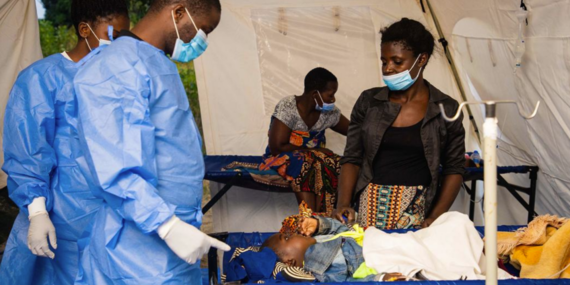Today's top news: Malawi, Mozambique, South Sudan, Haiti, Syria

Malawi
UN Under-Secretary General for Humanitarian Affairs Martin Griffiths has released $5.5 million from the Central Emergency Response Fund to support communities hardest hit by Tropical Cyclone Freddy. As of yesterday, the number of people displaced was at more than 490,000 in over 500 shelter sites.
The funds will support Government-led relief efforts and prioritize water, sanitation and hygiene in flood-affected areas to prevent the further spread of cholera. This is especially critical, as infrastructure has been destroyed and damage, and displacement sites are overcrowded.
The CERF allocation will also be used to prevent gender-based violence and to protect unaccompanied children, with families separated by the floods and mudslides.
UN agencies are working to provide shelter, food, health care and other supplies to those most affected by the cyclone.
The World Food Programme is supporting the Government by airlifting food supplies to hard-to-reach areas.
Mozambique
The number of people affected by Freddy’s second landfall has risen to 812,000. Overall, the storm and a cholera outbreak in the country have affected some 975,000 people.
OCHA and its partners continue to provide life-saving assistance in the most affected province of Zambezia.
There are enough medicines and supplies to control cholera and other water-borne diseases for 150,000 people for three months. Air transport is on standby to aid in the cholera response. Humanitarian partners are very concerned about the high risk of increases in other water-borne diseases. Some 10,000 people have received water and sanitation support.
In the city of Quelimane, flooding has disrupted the water supply – there’s enough fuel available for generators powering water pumps for 350,000 people.
Nearly 6,000 people in Quelimane and some 1,500 others in Inhambane province have received food aid.
In Tete province, humanitarian partners are also trying to reach 1,500 people stranded there. The World Food Programme is gearing up to distribute food through cash-based transfers.
South Sudan
The Humanitarian Coordinator ad interim there, Meshack Malo, has condemned an attack in Jonglei State. On 17 March, a humanitarian convoy transporting food and other aid came under attack. Two contracted drivers were shot, one fatally. Another person died in a road traffic accident as a direct result of the incident.
This is the latest in a series of incidents targeting humanitarian convoys and workers in the country. In January alone, more than 20 violent incidents against humanitarian staff and assets were recorded.
Following the latest attack, the World Food Programme temporarily pauses its convoy movements out of Bor in Jonglei. This corridor is critical to preposition food ahead of the rainy season when roads are inaccessible. More than one million people in Jonglei and Pibor rely on the food aid transported along this route.
Mr. Malo called on authorities to urgently improve security and to protect civilians and humanitarian workers and supplies. He said these recurring acts of violence disrupt the delivery of life-saving assistance and must end.
South Sudan is one the most dangerous places for aid workers, with nine humanitarian workers killed in the line of duty and 418 incidents reported in 2022.
In 2023, an estimated 9.4 million people in South Sudan are projected to need humanitarian assistance or protection services.
Haiti
Humanitarian needs have risen sharply and are expected to increase further this year. UN figures released on Friday indicate that about 5.2 million people in the country require humanitarian assistance. 57 percent of them are women and girls.
OCHA estimates that at least 1.5 million people – that’s half the population of the capital Port- au-Prince – are directly affected by gang violence.
Rape is being used to terrorize communities, and protection needs and gender-based violence have reached alarming levels.
Next month, the UN will launch this year’s humanitarian response plan to meet the needs of more than 3 million Haitians. Doing so will require $715 million.
Syria
In areas under government control, humanitarian partners have provided assistance to 324,000 people in February and 170,000 people so far in March, primarily in the most affected governorates of Aleppo, Hama and Lattakia.
In north-west Syria, since 9 February, an average of 22 trucks carrying aid provided by seven UN agencies have crossed from Türkiye to north-west Syria every day, using the three available border crossings.
Humanitarian partners warn about the lack of resources to replenish emergency stocks with the main Humanitarian Response Plan for Syria being only 5.7 per cent funded. Stocks have have been depleted, threatening the suspension of these activities unless urgent funding is made available. The healthcare system, already overwhelmed before the earthquake, is also at risk of collapse in some areas, depriving people in need of life-saving medical services.
An International Donors’ Conference to support the people affected by the devastating earthquakes in Türkiye and Syria is being held in Brussels today. The conference is hosted by the Swedish Presidency of the Council of the EU and the European Commission with the participation of the United Nations.
